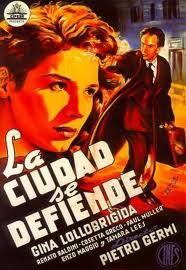
Here’s an archive review of Pietro Germi’s early crime film Four Ways Out (La citta si difende) from The Times in 1951.
Signor Pietro Germi’s new film Four Ways Out, which won an award at the Venice Festival last summer, has many of the qualities which have distinguished the best Italian films since the war. The direction emphasises by deft camera-work and attention to detail the poignancy of the story, the acting is so natural that it is impossible not to believe in the reality of the characters, and the backgrounds, even when not filmed in the actual places depicted, seem completely authentic.
The theme of Four Ways Out is not new – it concerns simply the attempted escape from justice of three men and a youth who have robbed a cashier’s office of millions of lire during a football match – but the treatment makes it much more than the conventional Criminal versus Society thriller. To begin with, the thieves are not habitual evil-doers, they are ordinary citizens who have been driven together and to crime either by need, or by disappointment or by the desire for excitement. Luigi (Fausto Tozzi) has a wife and child but no work – he steals to provide food for them. Paolo (Renato Baldini) was once a leading footballer and the idol of the crowd, but an accident to his leg has forced him to a poorer, more humdrum way of life; he steals to regain his wealth and his mistress. Guido (Paul Muller) is a disppointed and starving artist – he too steals from need. And Alberto, the youth (Enzo Maggio), is a child of poor parents who turns to crime only to have in his life some real excitment comparable with that in the lurid books and films that are his normal recreation. And in each case they are bought to justice or retribution more by the natural working of society than by the agency of the law. The city, in fact, defends itself. Luigi, though he escapes capture, is tortured by his conscience and commits suicide. Paolo is betrayed to the police by his erstwhile mistress, Guido is murdered by the avaricious and crooked skipper that he had bribed to help him escape, and Alberto, pursued by the police to the roof of the tenement in which he lived, is prevented from throwing himself off only by the pleading of his mother.
Such is the simple framework of the film and the only flaw in it is that there is inevitably a slight slackening of tension when the same thing (in this case pursuit) happens to four people one after the other. But in all other respects it is easy to see why this distinguished production was chosen for an award.
The Times, Monday, Dec 31, 1951; pg. 8